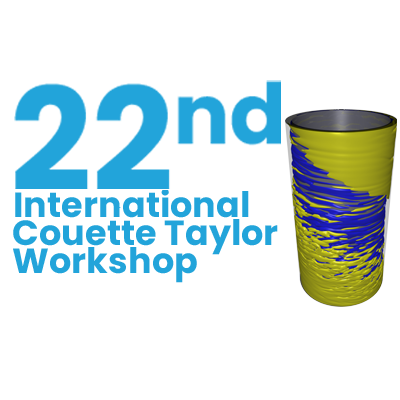
Local instabilities of a circular Couette flow in a vertical annulus with a radial heating
Please login to view abstract download link
In many physical and engineering applications one needs to consider an axial flow together with the azimuthal motion to model, e.g., tornadoes, trailing vortices, and swirling flows in combustion chambers. In addition, radial temperature gradient needs often to be taken into account in the studies of tropical cyclones (Emanuel, 2018) and flows in cyclone cooling systems of gas turbines (Seibold et al., 2022). The problem of stability of helical flows without thermal gradient has been studied earlier, e.g. by Leibovich and Stewartson (1983) who considered the problem for an unbounded, homogeneous and incompressible inviscid fluid subject to infinitesimal three-dimensional disturbances. By using an asymptotic analysis for large azimuthal wavenumbers, they were able to obtain a sufficient condition for instability, generalizing the Rayleigh criterion for centrifugal instability. Eckhoff (1984) extended the criterion to inviscid and compressible flows with geometric optics approach of Eckhoff and Storesletten (1978). In (Kirillov and Mutabazi , 2017) the geometric optics stability analysis has been applied to the linear stability of circular Couette flow with a centrifugal buoyancy induced by a radial temperature gradient in the absence of natural gravity (Meyer et al. , 2021). Axisymmetric and nonaxisymmetric perturbations were considered and both the thermal diffusivity and the kinematic viscosity of the fluid were taken into account revealing instabilities both at low and high values of the Prandtl number, including the visco-diffusive version of the Goldreich-Schubert-Fricke (GSF) instability. In the present work, a short-wavelength local stability analysis is performed of a helical base flow of an incompressible viscous fluid with radial temperature gradient and an Archimedean buoyancy, see e.g. (Yoshikawa et al. , 2013), in an attempt to further extend the Eckhoff-Leibovich-Stewartson (ELS) criterion. In particular, a newly derived explicit generalized Rayleigh criterion that combines the ELS criterion for instability of helical flows and the GSF criterion for the instability of azimuthal flows with radial temperature gradient, will be presented. Comparison will be made with available results from linear stability analysis (Meyer et al. , 2015), direct numerical simulations and from experiments (Guillerm et al. , 2015; Kang et al. , 2022) for a fixed value of the radius ratio.

